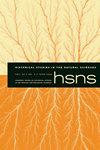布鲁塞尔的国会狂热(1846-1856
IF 0.3
3区 哲学
Q2 HISTORY & PHILOSOPHY OF SCIENCE
引用次数: 6
摘要
1853年,比利时皇家天文台的主任阿道夫·奎特莱(Adolphe Quetelet)欢迎来自几个国家的代表参加连续两次会议,这两次会议分别被认为是第一届国际气象学和统计学大会。本文考察了几个类似的国际大会(关于自由贸易、普遍和平、监狱改革、公共卫生等)在同一十年组织的地方背景。它认为,新的比利时国家发展这种新形式的国际会议是为了加强其在“国家协调”中的软实力。它还讨论了这些大会产生的国家利益和对科学效率的全球信念之间的紧张关系。本文是《科学外交》特刊的一部分,由朱莉娅·里斯波利和西蒙娜·图尔凯蒂编辑。本文章由计算机程序翻译,如有差异,请以英文原文为准。
Congress Mania in Brussels, 1846–1856
In 1853, the director of the Belgium Royal Observatory, Adolphe Quetelet, welcomed delegates from several countries to two consecutive meetings that have acquired considerable reputation as the first international congresses of, respectively, meteorology and statistics. This paper examines the local context where several similar international congresses (on free trade, universal peace, prison reform, public hygiene, etc.) were organized in the same decade. It argues that the new Belgian state developed this new form of international conference in order to bolster its soft power in the Concert of Nations. It also discusses tensions between national interests and global beliefs in the efficiency of science, which arose from these congresses. This essay is part of a special issue entitled Science Diplomacy, edited by Giulia Rispoli and Simone Turchetti.
求助全文
通过发布文献求助,成功后即可免费获取论文全文。
去求助
来源期刊

Historical Studies in the Natural Sciences
社会科学-科学史与科学哲学
CiteScore
1.00
自引率
0.00%
发文量
24
审稿时长
>12 weeks
期刊介绍:
Explore the fascinating world of Historical Studies in the Natural Sciences, a journal that reveals the history of science as it has developed since the 18th century. HSNS offers in-depth articles on a wide range of scientific fields, their social and cultural histories and supporting institutions, including astronomy, geology, physics, genetics, natural history, chemistry, meteorology, and molecular biology. Widely regarded as a leading journal in the historiography of science and technology, HSNS increased its publication to five times per year in 2012 to expand its roster of pioneering articles and notable reviews by the most influential writers in the field.
 求助内容:
求助内容: 应助结果提醒方式:
应助结果提醒方式:


